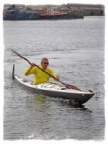- Posts: 424
- Thank you received: 52
Upwind is a Heavy or Light boat best?
Of course, the level of flex one gets in a glass boat would not be anywhere nearly as much as in a SOF as to make a difference IMO this way...
Aside from stiffness, whcih I don't think matters in this case much, I think a lighter boat will float over more waves and would need to shove out of its way less water, thus making it faster upwind. It is not only the overall weight, it is the swing weight that is important too - less swing weight (less weight at the ends) means the boat will wobble up and down more and cut less into the waves, which displaces less water, whcih is presumably good to the extent that you are not jumping up and down too much and splashing and wasting more energy this way over a heavier boat... So there might be a middle ground, depending on conditions...
Who knows... Perhaps one can next time they go out fill-up a couple of galons of water and place in the cockpit, time their upwind run, then toss the water out and time again? Repeat a few dozen times to get an average and report here? I don't think many would waste the time to try it diligently and if done otherwise any results will be pretty meaningness...
Please Log in or Create an account to join the conversation.
- AndyN
- Visitor
I've had more than a few k1's and personally I choose to go for a stronger construction that weighs around 10kg and don't notice a performance deficit. Slightly off topic I know.
Please Log in or Create an account to join the conversation.
- kayakchampeen
-

- Offline
- Senior Member
- Posts: 72
- Thank you received: 48
Please Log in or Create an account to join the conversation.
I read somewhere the deflection difference can be as much as 4 cm.
For these reasons a carbon boat is also a narrow boat as it sits in the water. The pros have the technique and core to handle this whereas I don't.
Please Log in or Create an account to join the conversation.
What I gleaned from this is that while the lighter ski should have been faster according to lower drag and better acceleration, its lower momentum and more porpoise-ing movements gave it sort of a braking effect and continually killed its speed, whereas the heavier and straighter running ski was able to keep better momentum even though it took a bit more energy to keep it going. Mind you, the difference was minimal, maybe 0.1 or 0.15 mph, but noticeable.
All skis might not act the same way, though. I suspect a ski with a more knife-like bow will be affected less by porpoising movements and a ski with a fatter nose will be affected more.
Also, along the same lines, I remember reading a paper that compared rowing shell weights with speeds. Turned out that lighter was faster only down to a point. Too light a shell was slower (www.atm.ox.ac.uk/rowing/physics/weight.html) See 9. I suspect going upwind in small wind waves does much the same thing.
Please Log in or Create an account to join the conversation.
- Posts: 177
- Thank you received: 23
nell wrote: I noticed that I was not catching and passing the paddlers in front of me any longer and that my ski was porpoising up and down much more even though my ski felt lighter and quicker.
All skis might not act the same way, though. I suspect a ski with a more knife-like bow will be affected less by porpoising movements and a ski with a fatter nose will be affected more.
Displacing more water going through waves rather than floating on top can be quicker!
Please Log in or Create an account to join the conversation.
Please Log in or Create an account to join the conversation.
Past skis: Spirit PRS, EpicV10Sport Performance, Epic V10 Elite, Stellar SES Advantage. Current skis: Fenn Elite Spark, Fenn Swordfish vacuum. Custom Horizon, Epic V7
Please Log in or Create an account to join the conversation.
- duncangroenewald
- Offline
- Junior Member
- Posts: 39
- Thank you received: 1
Consider "nell" above with his V12 - its possible that the additional weight of water made the V12 more stable and allowed him to apply more power to his stroke. Its also true that the excessive porpoising with an empty boat may have slowed him down more. Especially as he most likely accelerated from the start with an empty (light boat) so paid no weight penalty then.
My experience is similar with a V12, I weight around 78kg and think I am too light to sit this boat properly in the water. Also it seems to have lots of volume up front so goes over most chop and bashes down quite hard.
I now paddle a Flow Kayaks SharpSki 6.5 which seems much more suited to my weight, has a narrower bow and slices through the chop much better than the V12 did with me in it. The seat is also a much better fit and I feel 'connected' to the ski. As a consequence the boat does what my hips want it to do, not what the chop wants it to do, I feel more stable and can apply more power with less effort - as a result I seem to go faster upwind. Of course this is rather subjective but it certainly makes me feel happier. Both boats weigh virtually the same - 13.5kg with leashes and other bits attached. Of course I would prefer a 8kg boat with the same shape, stiffness because acceleration would be quicker etc.. bearing in mind that 1kg represents just a bit more than 1 percentage point more weight. So shaving off 5.5kg is bound to make a big difference to acceleration but not much to punching through/porpoising over the waves because the hull is already very narrow with relatively low bow volume and the weight coming off will be evenly distributed, unlike the water in the cockpit that is relatively forward in the boat.
Flat water I would say the V12 is a fraction quicker, like maybe 12.5kph average over 10km, vs 12.4km in the SharpSki. Not sufficiently different to really attribute just to the boat though.
just my 2 cents worth...
Please Log in or Create an account to join the conversation.
Please Log in or Create an account to join the conversation.
When I sit in my 15.5kg glass boat my total mass is around 110-115kg. A 4kg saving in boat weight is around 3 and a bit % (my kingdom for a calculator) of the total weight. This is a fair bit less mass to accelerate with every pull on the paddle.
If you only weigh 70kg that 4 kg saving in weight is probably getting closer to a 5% saving in total mass. So I figure the more you weigh the less critical the weight of the boat is. There is still a benefit but not as much.
Assuming that power to weight ratio is as important in paddling as it is in most other sports and assuming that a bigger paddler is probably stronger than a smaller paddler the difference is probably even less critical.
Not withstanding the effects of stability, boat, technique, paddle, weather, wave shape, wind strength etc, etc. it is probably a much bigger advantage for a lighter paddler to have a light boat with reduced volume and windage than a big guy.
The end
Please Log in or Create an account to join the conversation.
- [email protected]
-

- Offline
- Admin
- Posts: 1839
- Thank you received: 411
So we had a major head-bang out to the lighthouse and then a superb 5km downwind back to Fish Hoek.
I was on a heavy Evo II (somewhere around 18kg). I found that I was able to grind away into wind, when some of the other guys seemed to be affected far more, being flung sideways as they ramped over the oncoming waves.
At the lighthouse, thinking I knew the ground far better than most, I cut the corner too sharply and was dumped out of the boat by a breaker. I had to swim it past the rocks before I could get back in, by which time the mob that I'd been with had pushed out way in front.
One of them was on a very light Nelo; another on a light V10. Once I got going again, I overtook the Nelo and V10 and caught up with the (female!) Fenn Elite on the beach.
Of course this could all be due my stunning rough water skills, but I rather think the stability and perhaps the weight of the boat helped. (I'm hopefully getting a light Evo II to test in the near future...)
Rob
Currently Epic V10 Elite, Epic V10 Double.
Previously: Swordfish S, Evo II, Carbonology Zest, Fenn Swordfish, Epic V10, Fenn Elite, Red7 Surf70 Pro, Epic V10 Sport, Genius Blu, Kayak Centre Zeplin, Fenn Mako6, Custom Kayaks ICON, Brian's Kayaks Molokai, Brian's Kayaks Wedge and several others...
Please Log in or Create an account to join the conversation.
- PaddleFaster
-

- Offline
- Premium Member
- Posts: 111
- Thank you received: 34
Those with rock solid balance and a strong, quick stroke will probably, for the most part, be fastest in the lightest boat.
Those that are not near pro level strong paddlers, have possibly a slower cadence and possibly weaker balance skills, will probably be faster in the slightly heavier, slightly more stable boat.
In other words, I do not feel that there is an absolute, definitive answer, to the question. A beginning to low level intermediate paddler may achieve their fastest upwind times in one layup, and a higher level, intermediate to pro paddler, in another.
Please Log in or Create an account to join the conversation.
Please Log in or Create an account to join the conversation.
Please Log in or Create an account to join the conversation.
- PaddleFaster
-

- Offline
- Premium Member
- Posts: 111
- Thank you received: 34
Besides, I don't even know what I said anyway!
Please Log in or Create an account to join the conversation.
Racing pros push their boats to the max with each stroke. The real speed advantages come from expertly picking lines downwind, where lighter boats with quicker acceleration mean the difference between catching runs or not.
Please Log in or Create an account to join the conversation.
- slim white
-

- Offline
- Senior Member
- Posts: 60
- Thank you received: 1
Lighter surfskis in rough could easily run away if not secured and less stable in the rough too.
Lighter skis start moving easily the first two meters later on the heavier ski maintain the cruise speed by its inertia.
On sea I prefer heavy boats, on flat water races lightest as possible ones.
When you get what you want you don´t want what you get
Please Log in or Create an account to join the conversation.
Provided I could keep the hammer on I was jumping ahead into the chop. Its all about technique.
Please Log in or Create an account to join the conversation.
A lighter surfski will always be faster upwind - but…
Said ski must ALSO:
Be designed for my weight (120 pounds).
Mustn't have too much volume out of the water so as to not act like a sail.
Ludovic
(Brittany, France)
Please Log in or Create an account to join the conversation.
Latest Forum Topics
-
- Surfski Width x Length Chart - 5th March 2025
- 1 day 15 hours ago
-
- Nelo models getting confusing
- 3 days 5 hours ago

